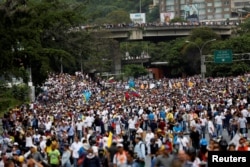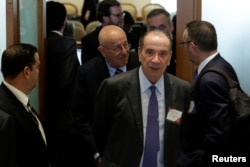Venezuela’s political, economic and social breakdown is getting a hard look from the international community on Wednesday, with the Organization of American States considering solutions at a special meeting in Washington and the European Parliament doing the same, hours earlier, in Brussels.
Both groups are trying to help restore peace and stability in the South American country, reeling from two months of often violent protest against left-leaning President Nicolás Maduro.
At least 60 people have died in clashes between protesters and Maduro supporters and security forces.
The OAS meeting, scheduled to begin in mid-afternoon, brings together high-level representatives – including at least 18 foreign ministers – from throughout the Western Hemisphere. Venezuela likely will be alone among the 34 member states to go unrepresented.
In April, Maduro’s administration announced the country would withdraw from the OAS, accusing its chief, Luis Almagro, of joining in a U.S.-led a campaign to undermine Venezuelan sovereignty.
But Venezuela could send a surprise representative to defend its position before foreign ministers – and to block any conclusive action against Maduro. He has called for revising the country’s constitution, beginning with a constitutional assembly in July. His critics fear a redrawn document could interfere with long-overdue elections and other efforts to restore democratic norms.
European Parliament weighs in
In Brussels, European Parliament President Antonio Tajani denounced Maduro’s plan for a new constitution. It’s “a new coup with the sole purpose of consolidating this authoritarian regime,” the Associated Press quoted him as saying.
Tajani also characterized Venezuela’s planned withdrawal from OAS as an act of “regional isolation that is harmful for the country.”
He challenged the parliament to help “find a peaceful solution to this crisis” and said he would ask its leaders to consider imposing sanctions against select Venezuelan officials, as the United States has done.
Tajani was joined by Julio Borges, president of Venezuela’s opposition-led National Assembly. Borges said Venezuelans sought “the opportunity granted by their own constitution to have free general elections,” the AP reported.
OAS draft resolutions
In Washington, the Organization of American States so far has received two draft resolutions for discussion Wednesday.
One – submitted by the United States, Mexico, Panama, Peru and Canada – asks the OAS to discourage the Maduro administration from convening the constituent assembly as currently devised. Critics contend the proposed assembly of at least 540 citizens – some locally elected, some selected from interest groups such as farmers, students and laborers – would not fairly represent Venezuela’s 31 million people and would be stacked in favor of the ruling Socialist Party.
That draft resolution lists other reforms, including urging the suspension of Venezuelan military courts’ prosecution of civilians.
A second draft resolution – from the Antigua and Barbuda mission – also opposes the constitutional assembly.
Maduro called for the revision, saying it was needed to bring peace and to prevent his rivals from staging a coup.
US backs ‘unified regional approach’
A senior U.S. State Department official, speaking Tuesday in a news teleconference, said that Washington supported "a unified regional approach to help Venezuela find a peaceful, democratic and comprehensive solution to its current problems."
The official called for OAS member states "to act collectively to ensure that the nations of our hemisphere support democracy, human rights and the rule of law."
He urged "good-faith negotiations" among all Venezuelans, adding that "the main responsibility for showing good faith in any negotiations now is on President Maduro and the government of Venezuela. We seek the full diplomatic strength of our hemisphere to help make such negotiations possible…."
He and another senior official on the phone call mentioned that the OAS was considering a "contact group" to facilitate negotiations with Venezuela. Its size and composition were up for discussion.
'Be our voice at this moment'
Once Latin America’s wealthiest nation, the oil-rich country’s fortunes plummeted with a 2014 downturn in global crude prices and with government mismanagement. It’s plagued by widespread shortages of food, medicine and other basic goods.
Anti-government protesters have taken to the streets almost daily since early April, demanding elections, the release of political prisoners and access to humanitarian aid.
In Caracas, youth leader Daniel Martínez Yabrudi told VOA he was heartened by the OAS and others’ increased focus on Venezuela after years of increasing strain on its people.
"Little by little," Martínez Yabrudi said, “the countries of the OAS, the countries of the world have realized that they cannot be accomplices" to repression.
"We directly ask our sister nations to be our voice at this moment," he said, "... because what happens in Venezuela affects the region."
VOA Spanish Service correspondent Alvaro Algarra contributed to this report from Caracas, Venezuela.






